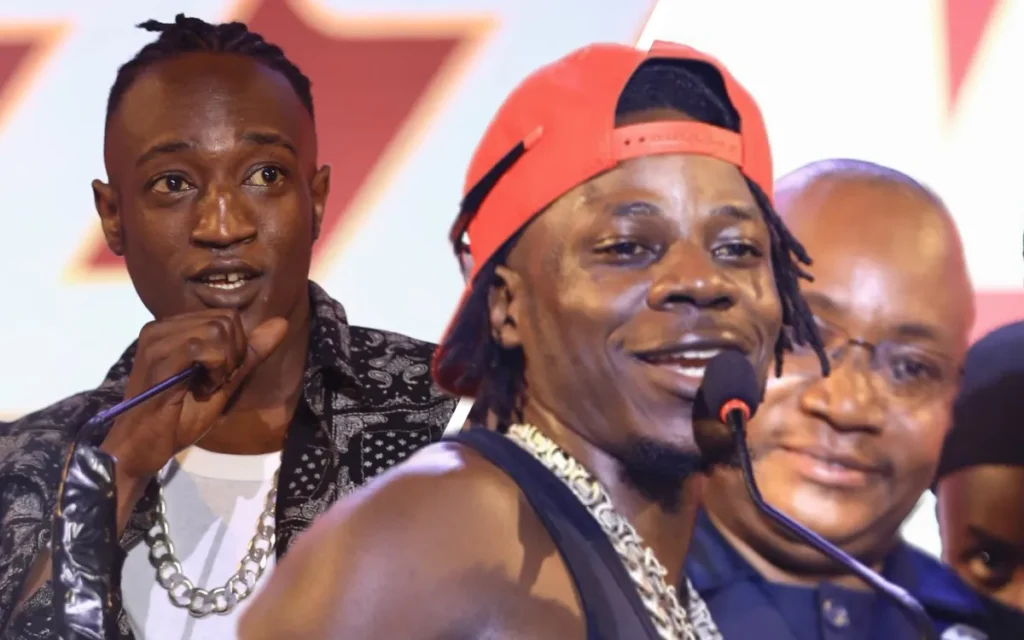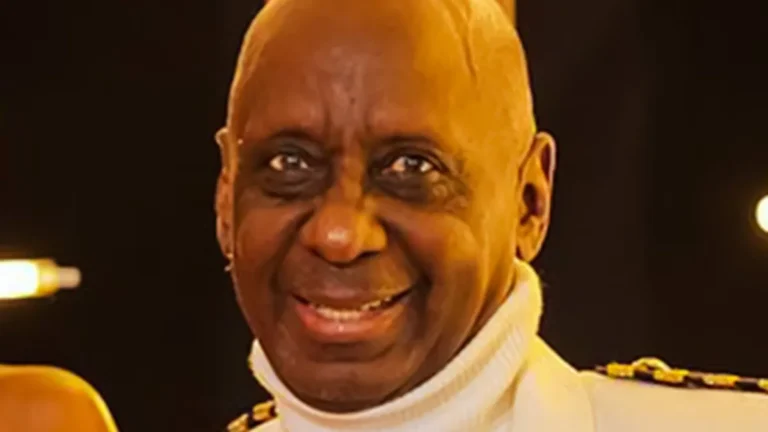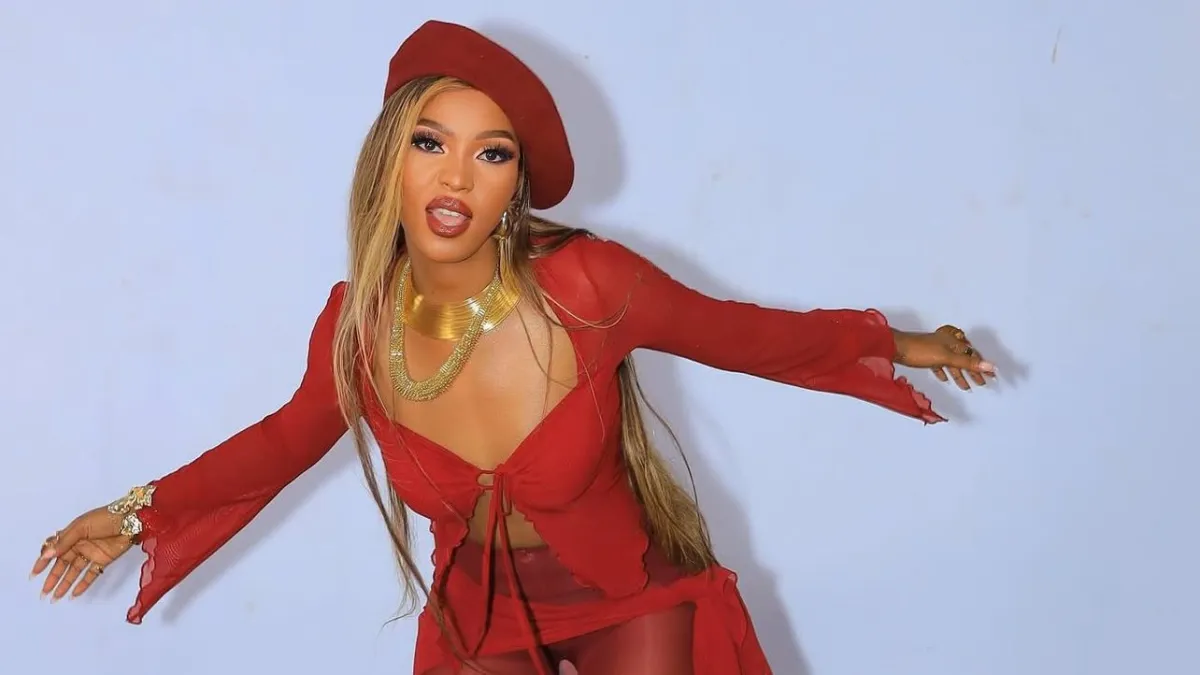Uganda’s entertainment scene is no stranger to drama, but this time the fire didn’t come from a stage performance or a viral street brawl—it came from the sharp tongue of one of the country’s most respected voices in the arts.
Veteran dramatist and cultural critic Alex Mukulu has taken aim at controversial singer Alien Skin, dismissing him as nothing more than a “poet” masquerading as a musician. And if that wasn’t enough, he lumped rising star Fik Gaza into the same category, accusing the new crop of entertainers of “lowering the standards” of Uganda’s once-glorious music industry.
The blunt remarks, delivered during an interview with Spark TV, have already set off heated discussions across social media, with fans split between defending their favorite stars and praising Mukulu for “telling it like it is.”
“Musicians Don’t Form Gangs”
According to Mukulu, the difference between today’s hitmakers and the legends who came before them is night and day. He didn’t hold back, claiming that real musicians focus on their craft, not street fights or gang-related drama.
“A real musician cannot form gangs to attack others,” Mukulu declared. “They aren’t musicians, they are thugs actually. Where did they come from?”
For Mukulu, the comparison is simple. The golden generation of Ugandan music—icons like Philly Bongoley Lutaaya, Fred Masagazi, Kawalya, and Elly Wamala—built their reputations on timeless records, not feuds.
“Have you ever heard that Lutaaya is fighting with Masagazi? Or that Kawalya was throwing fists with Elly Wamala? No,” he continued. “All they did was sing music.”
Old School vs. New School
Mukulu’s words highlight a growing tension within Uganda’s music industry—the generational divide between classic legends and modern-day stars whose rise is often fueled by controversy as much as talent.
Where earlier generations were celebrated for soulful ballads and revolutionary sound, today’s musicians like Alien Skin thrive in an industry where street credibility, viral moments, and shock value often equal fame.
But Mukulu argues that this shift is eroding the very foundation of Ugandan music. To him, stars like Alien Skin and Fik Gaza aren’t carrying the torch—they’re burning it out with cheap antics.

“Those Boys Are Poets”
Perhaps Mukulu’s most stinging remark came when he dismissed both Alien Skin and Fik Gaza not even as musicians—but as poets.
“Alien Skin, Fik Gaza… aren’t singers,” Mukulu insisted. “You can even see from their names. Why can’t they use their actual names? Those boys are poets.”
The jab cut deep, especially given how Alien Skin has built his brand on a defiant, streetwise persona that blurs the lines between musician, poet, and activist. For his fans, that raw authenticity is exactly what makes him stand out. For Mukulu, however, it’s proof that he’s not a musician in the traditional sense.
Alien Skin: The Rebel of Uganda’s Music Scene
Love him or hate him, there’s no denying that Alien Skin is one of Uganda’s most talked-about entertainers. Bursting onto the scene with hits like Sitya Danger and Party, he quickly became a voice for Kampala’s urban youth.
His unapologetic style—marked by gritty lyrics, eccentric fashion, and frequent clashes with industry insiders—has made him both a hero to fans and a headache for critics.
Earlier this year, Alien Skin made headlines after forming a loyal street movement that some critics describe as a “gang.” To supporters, it’s a community of young people finding identity through music. To Mukulu and others, it’s dangerous behavior that undermines the integrity of the craft.
Fik Gaza: Rising Star or Controversial Copycat?
While Alien Skin often takes the bulk of criticism, Fik Gaza has also faced scrutiny for adopting a style that mirrors Alien’s raw, street-heavy approach. His lyrics, stage persona, and public image have drawn comparisons—and sparked debates—about whether he’s bringing innovation to the game or simply riding on Alien’s chaos-fueled wave.
For Mukulu, both artists represent a worrying trend: fame built not on musical legacy, but on controversy and spectacle.
Fans React: “Poet or Not, We Love Him”
Following Mukulu’s interview, social media platforms lit up with mixed reactions.
- Some fans applauded Mukulu for defending Uganda’s musical heritage:
“Finally, someone said it! The industry needs standards, not street gangs.” - Others rushed to Alien Skin’s defense:
“Poet or musician, Alien speaks for the streets. That’s why we ride with him.” - And, of course, memes and jokes flooded X (formerly Twitter), with users posting clips of Alien Skin’s performances captioned: “When the poet takes the mic.”
Why This Debate Matters
Beyond the clapbacks and Twitter threads, Mukulu’s comments point to a much larger conversation about the future of Ugandan music.
Is the industry evolving in the right direction, or is it losing touch with the artistry and discipline of its golden age? Are today’s stars redefining what it means to be a musician, or are they trading talent for theatrics?
These are questions that go far beyond Alien Skin himself and cut into the heart of what Ugandan music culture will look like for the next generation.
Final Thoughts
Whether you side with Alex Mukulu or Alien Skin, one thing is clear: the debate over what makes a “real musician” in Uganda isn’t going away anytime soon.
Mukulu has fired his shots, but in typical Alien Skin fashion, fans are waiting to see if he’ll clap back with a fiery response of his own. If history is any indicator, this war of words could turn into the next big entertainment headline.
Stay tuned—because when it comes to Alien Skin, drama is never far away.
💬 What’s your take? Is Alien Skin a poet, a musician, or both? Drop your thoughts in the comments and let’s get the conversation going!





